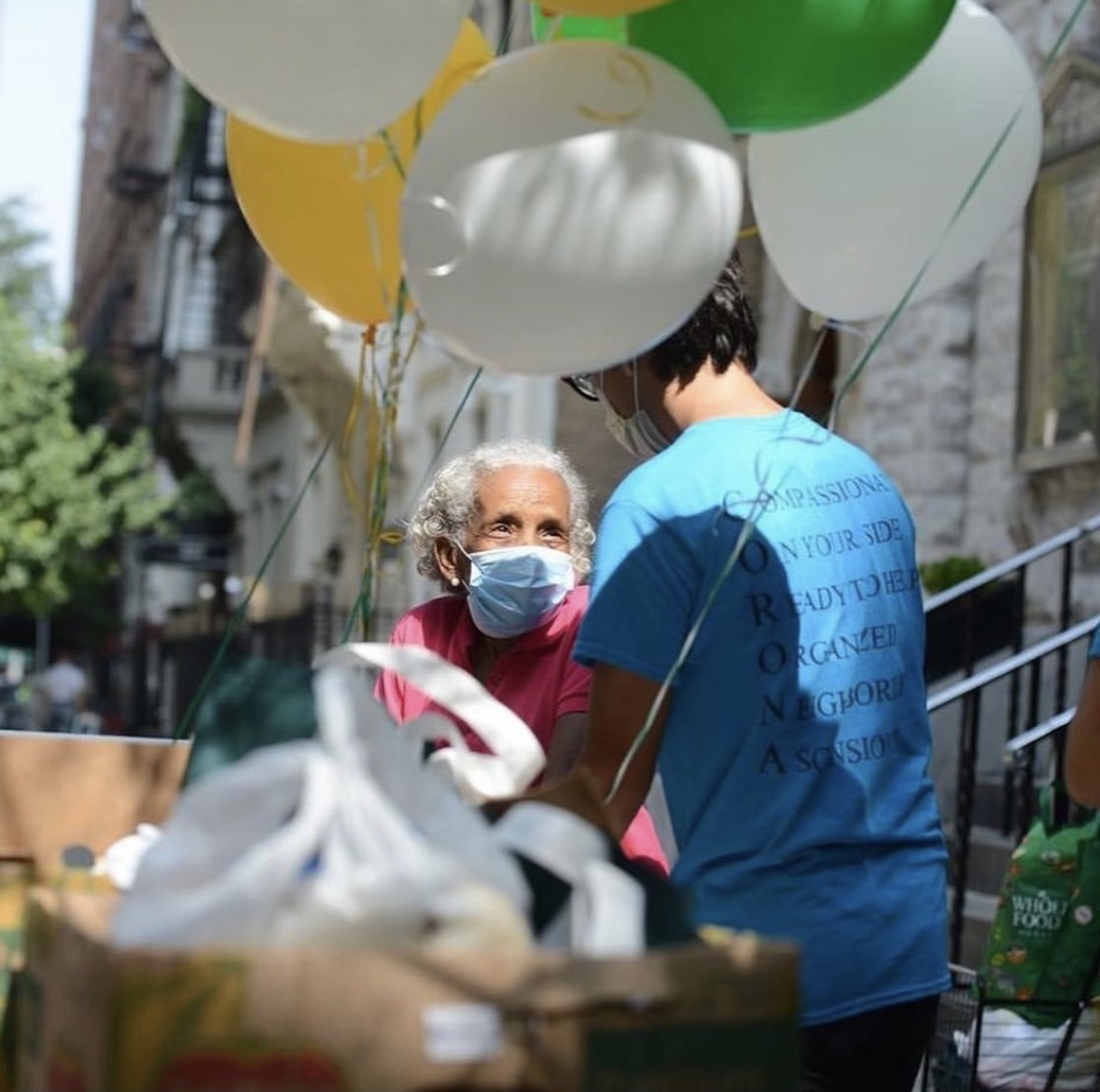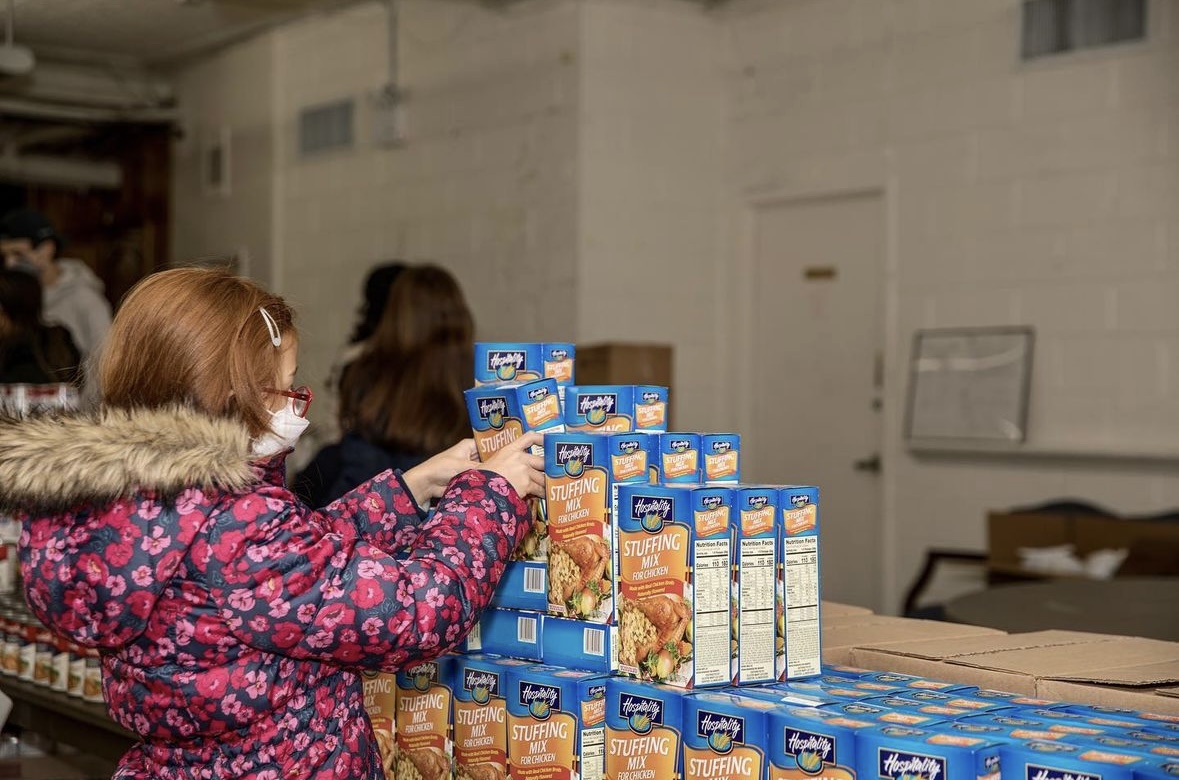I’ve been volunteering at Ascension Food Pantry, at 107th and Broadway in Manhattan, since I was in fifth grade. I’ve always felt better after I left, and excited to return. I wondered why I felt this way, so I decided to dig into this.
The first thing a volunteer receives when they step into the church basement at 9 a.m. is a hug and smile from Robin. “Feel free to grab some bagels or donuts or orange juice,” Robin says. In the room with bagels, volunteers as young as six and as old as high school seniors chit-chat and enjoy the food.
While most teenagers would rather be asleep, volunteers in the Ascension Church basement wear smiles and move with purpose. If new volunteers are lost, more experienced volunteers help them find a job. Robin calls these experienced volunteers “leads.” “I never say somebody’s the boss, or the manager,” said Robin. “If a kid is a lead, they’re just a lead; they’re not to yell at other kids. And my title is director, not boss. I don’t say, ‘I’m the boss, don’t do anything without me.’ So dignity, it transfers not only between us and the clients, but between the volunteers.”
A common job before opening the food pantry is packaging fresh produce or bread into bags so they can be served later. Groups of 15-and-16-year-olds unpack large boxes of chickens onto tables to be served to clients.
At 9:30 a.m., volunteers at the pantry gather to pray and then Robin asks, “What’s the word?” Volunteers respond unanimously, “dignity.”
The choice to use the word ‘clients’ is a conscious one made by Robin and the volunteers, as is the choice-based style of the pantry. At each station, clients are offered different foods which they can choose from. If they don’t want to take the food, they don’t need to.
The choice-based style is evident not only in how the food is distributed but in the types of foods that are provided. “We’re moving now to serving different foods. For example, we’re going to have a choice of flour or corn meal because a lot of our new neighbors, our new migrants, are getting settled into apartments and they want the food that they’re used to. A lot of this food we want to provide is the Goya brands which we carry a lot of. We’re also working to provide fajitas, for example. Many of these migrants have been eating at soup kitchens and sandwich lines for over a year now. That’s all well and good, but I don’t think people appreciate that as much as people appreciate eating food that they want, when they want, with the company of their own family, and in their own home,” Robin said.
Before clients can enter the basement to take food, they often have to wait in long lines outside.
But now, the lines are improving. The pantry has initiated a switch to using the app Plentiful, where clients can book time slots to come to the pantry. Their goal is to have everyone who comes to the pantry using the app in a year, because it will ensure that families don’t have to wait in line starting as early as 6 a.m.
While Robin is now trying to reduce the congestion, that wasn’t always the case. Before it was founded in 2014, the food closet at Ascension was “an old metal closet that was in the back, and they had maybe 10 cans of old, rusty, maybe expired food, and once a year they would collect food for Thanksgiving day. But besides Thanksgiving, the food would sit in this closet, so if someone ever came in desperate they would give them a few cans of food,” Robin said.
When Robin started the food pantry, it served 60 or 70 clients each month and had 20 kids helping. Robin and the volunteers used to go to Broadway to hand out flyers to spread awareness of the food pantry, a stark contrast to how busy it is now.
The pantry continued to grow, and then the pandemic hit. “All the other pantries which were run by old ladies closed because the women were vulnerable. And restaurants closed and schools closed; everything was closing. Even the Columbia cafeteria shut down. We got all their food. This freezer (she points to a freezer behind me) is from a restaurant that closed down. We got commercial shelving. I just said, ‘I’ll take it all I’ll take it all I’ll take it all.’ This was March of 2020, and we started opening up weekly. Our clientele grew from 60 to over 300 families. I put the word out and kids were coming out in droves, because they wanted to see other kids. We had masks, hand sanitizer, gloves, and we were spraying crates in the street with lysol, and because we wanted to maintain social distancing, I could only have so many kids in here, we started the sign up sheet, which I now need because I have so many kids looking to volunteer,” Robin said. Recently, the pantry has had double shifts to accommodate the surplus of volunteers; one that comes in at 9 a.m., and another that comes in at 11 a.m.
Before Robin started the food pantry, she traded interest rate derivatives on Wall Street for 30 years. “When the market took a big hit in ’09, it just got ugly. It got very competitive and people weren’t trusting each other. And I was 50. It’s definitely a young boys’ club, not an old ladies’ club,” Robin said.
Robin started the pantry to offer community service opportunities for the kids of Ascension School and Parish. When Robin became Director of Religious Education at Ascension, she needed a certification as a catechist, who are lay members of the Catholic Church certified to teach Christian principles. “I loved getting my catechist certification so much that I ended up going back to Fordham to get my degree in Theology at 54 years old. I graduated at 59, right before the pandemic. So I worked all day and I went to school at night, as if I was 25 years old. I really loved it.”
Robin is constantly working to grow and improve the pantry, but her job is to supervise all 57 Catholic Sunday Schools in Manhattan. “I work all weekend,” she told me with a smile on her face, “like tomorrow morning I have a 10 o’clock, a 1 o’clock, and a 4 o’clock. I’m constantly running. Sometimes I’ll be down at Alphabet city, up in Inwood, and then I’m up in East Harlem.”
Despite being a catechist, Robin works to ensure that the food pantry is a place welcome to volunteers and clients of all religions. Mormons from the Church of Jesus Christ of Latter-Day Saints, The Muslim volunteers of New York, Jewish volunteers from a nearby synagogue, and kids from non-religiously affiliated high schools seeking to fulfill their service hours all volunteer at Ascension.
Robin applies the same philosophy to those she serves. “I don’t care what color you are, where you live, I don’t care how much money you have in the bank,” she told me. “You could have 3 million dollars sitting in the checking account and you’re waiting in line at my pantry, and that’s ok, because I don’t judge you. That’s maybe where the faith comes in. God is the judge, I’m not the judge.”
That philosophy of non-judgement and dignity for all is apparent in the food pantry’s community.
“Ms. Robin makes Ascension different from other volunteering sites. Ms. Robin helps us find a station if we don’t have a job. We get to know everyone we’re working with. If you need help with something, someone’s there to support you. If you need help carrying something, someone’s right behind you. Anyone who wants to volunteer will be welcomed with open arms,” said Daniel Bayo, a senior at La Salle Academy.
“I think Ascension is a wonderful place to be because there’s a sense of community there, and the people you meet there will want to make you come back next month. Robin treats you like a friend, not just a worker to do things. At a lot of the other places I’ve volunteered at, they just treat you like a worker who’s disposable,” said Beiya Tang, a sophomore at St. Vincent Ferrer.
Robin takes pride in her work because it helps both the clients, and the kids who volunteer. When I met with Robin, she read me a letter she wrote requesting funding for the pantry. “Our kid and teen volunteers are learning to be good, giving, and caring citizens. Please, I don’t want them to lose this opportunity to do so much for our neighbors in need,” Robin shared.
“Ms. Robin has helped me a lot as a person. But from the food pantry, it has taught me that it doesn’t take a lot of time to do something thoughtful,” said Owen Bleakney, a student at Xavier High School. “I learned that the more you do for others, the more you do for yourself as well. Volunteering at the food pantry helps me contribute to leading a true Catholic lifestyle.”
Matthew Bass, a senior at Xavier High School, described the food pantry as “a place where you can help those who need it by serving the community and building one along the way.”
After studying the pantry, I saw that the spirit of dignity is in all of Robin’s choices. I saw that when an institution makes a conscious commitment to a principle, it impacts how everyone there operates. And when that principle is dignity, kids want to be a part of it and learn a lot in the process.
Robin takes pride in her work because it helps both the clients, and the kids who volunteer.


